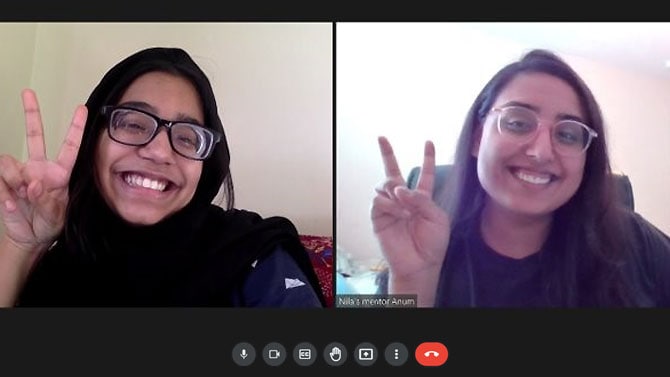Putting our digital skills to work in the name of social justice
Helping build a more equitable future for Black and Latinx college students in the US
Situation
Analysing data = understanding what makes a meaningful mentorship experience #itstime
With 71 million young people worldwide unemployed¹ and between 20-40% of the jobs currently held by 16-24 year olds at risk of automation by the mid-2030s², developing the skills required for the digital age is one of the most acute challenges communities are facing.
As the world faces a growing gap between those with access to opportunity and those without, PwC US is committed to helping address racism and inequity in society and have enabled their people, through their pro bono programme Skills for Society, to give 40 hours to each employee to support organisations advancing social justice.
iMentor, a US based youth focused non-profit, addresses the economic and racial divides that exist within the educational system and communities by helping to build mentor relationships that empower first generation students from low-income communities to graduate from secondary school, and succeed in university. PwC US professionals have supported iMentor since 2012 and today more than 250 PwC US staff across New York, Chicago and the San Francisco Bay Area provide mentoring through the organisation. Each mentor commits at least three years to mentoring a single student³.

Mentee Nila and her mentor Anum connecting through the iMentor program during the pandemic.
Image source: iMentor
As part of Black History month in 2020, PwC US launched a large-scale pro bono project with iMentor which involved 86 PwC professionals including 24 who already serve as iMentor mentors. The project required analytical skills to map and draw insights from large amounts of data iMentor had collected around mentor behaviour. The data insights focused on how often mentors met with mentees and which mentors sought to understand the importance of educational equity. This project provided much-needed resources to help iMentor analyse its data and draw insights into what contributes to a meaningful mentorship experience.
"Through this project, my team got to work on a cause they’re passionate about - one that supports what PwC US is doing to stand up to racism and drive societal change. And at the same time, they were able to challenge themselves and grow professionally. That’s the power of our purpose in action."
Experience
PwC applies experience in data-driven solutions #bethesolution
The PwC professionals working on this project were broken up into teams to help analyse one of six questions such as ‘Under what programmatic and contextual conditions do we see the most growth in students’ knowledge, skills, and mindsets?’.
The PwC US team helped iMentor apply a customer journey lens to mentors’ experiences, providing a holistic view of the multiple impact points a mentor has with the organisation outside their 1:1 relationships with students. The mapping of the mentor lifecycle has helped iMentor identify areas where they can create greater efficiency, improve communications and help target the right participants that will deliver on iMentor’s promise - providing powerful support to first-generation students to help set them up to thrive in life, not just survive.
The project also aligned perfectly to PwC’s own upskilling journey, of the 86 PwC professionals, 15 staff who had recently completed their Digital Accelerator training, now had an opportunity to test and grow their own professional capabilities.
"This powerhouse team brought their analytical rigor and creativity. The results of this project will provide iMentor with new analysis and insights that will help inform the work of key stakeholders across the organisation, and help deepen our understanding of our program and its impact. It’s also helped us surface other questions critical to our ability to help students achieve post-secondary success."
Impact
Better insights into mentor lifecycle = great support for underserved students #togetherwesolve
The insights have allowed iMentor to use data more strategically to encourage volunteers to become impactful mentors. Through this collaboration with iMentor, the PwC US team:
- Helped iMentor better leverage data-based insights to strengthen its programming and reach more students.
- Helped position the nonprofit to support approximately 30,000 students by 2023 - many of them will be the first in their families to attend college.
- Applied and expanded iMentor’s staff digital skills.
- Applied and expanded their own digital skills.
- To date, during this school year, PwC professionals have volunteered 4,437 hours mentoring students through iMentor. These hours have focused on helping their mentees develop social capital, write resumes, build career exploration plans, learn financial planning and more.
- PwC US has also provided US$150,000 to iMentor as part of their 2021 Access Your Potential commitment.
¹2020, Global Employment Trends for Youth 2020, International Labour Office
²PwC UK. 2018. Will Robots really steal our jobs.
³PwC US website. 2020. Supporting underserved students in reaching their full potential through mentorship.
















